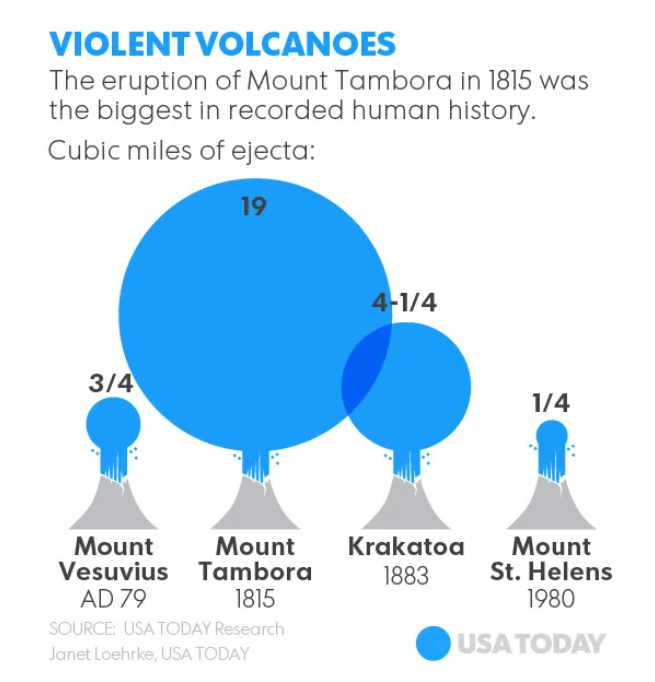When living in unprecedented times, one can’t help but search for other unprecedented times, even if the word itself literally means NEVER HAVING EXISTED IN THE PAST.
One cannot help but rebel.
One will also stop using one and instead share with you the moment in history that caught my eye.
1816 – The year without summer
Summer did not bloom that dark, dismal year in Europe and North America.
The cause? A volcanic eruption the year before, in April 1815, all the way in Indonesia. The ground-breaking, Mount Tambora ejected so much ash into the atmosphere that it blocked the sun and darkened the skies above it. Here’s a graph to demonstrate how big the eruption was.

Ash travelled for 800 miles. I didn’t know what 800 miles looks like so I looked it up for you (mainly for me). It’s roughly the distance between London and Lisbon.
Then it entered the stratosphere (never a good sign). When that happens a chemical reaction causes sulfate aerosols to form above rain level. These reflect the sunlight, thus cooling the whole of Earth!!
Talk about the weather!
Bad weather stretched into the following year and in 1816 the summer was filled with extreme cold, snow, rain, darkness, cloud, more darkness and more cloud.
Dire it most certainly was. But it was also the springboard (or shall we say extended-winter-board) to the most famous gothic tales we have to date.
What do writers have to do with volcanoes?
I shall tell you. A group of creatives- Lord Byron, Claire Clairmont, Dr. John William Polidori, Percy Shelley and Mary Shelley were on holiday at Lake Geneva when the endless rain trapped them indoors for days and days on end. Growing bored and restless, Byron suggested each writes a ghost story to share with the group.
Off they went to put pen to paper, occasionally glancing up at the apocalyptic dark sky. Remember, this is 1816, they didn’t have the news or weather explaining the cause of the dark skies. It was only in the 1960s that scientists discovered that link. So can you imagine what must have raced through their mind when they looked through their windows. It must have felt like the world was ending very slowly and very eerily.
What emerged from this isolated darkness retreat?
Byron wrote “Darkness” which, like another great speech, starts with having a dream:
“I had a dream, which was not all a dream.
The bright sun was extinguish’d, and the stars
Did wander darkling in the eternal space…”
Polidori, a young medic, wrote “The Vampyre”, which became the first vampire short story to be written in the English language. It was released under Lord Byron’s name though but went on to inspire many writers including Bram Stroker who wrote Dracula 80 years later.
And finally Mary Shelley gave us the legendary “Frankenstein”.
We all know that guy, right? The novel was a unique mix of science-fiction, Gothic horror, tragic romance and a parable which fascinates the imagination and film directors to this day – the Frankenstein monster has appeared in over 70 films since 1910.
And now to us.
And so nearly two centuries later we find ourselves also somewhat physically confined but left with our imaginations free to roam. We may have different monsters (COVID), but we have the same anxieties about uncertainties up ahead. This wonderful historic tidbit I stumbled upon has reminded me that even from the darkest moments (pun 100% intended) comes creativity.
You may be in lockdown, you may be out of it, but your industry hasn’t recovered. Wherever you are, whatever happens, you have your imagination and that is more powerful than anything. So grab a pen and journal, write, or mind map to let your creativity out and you’ll be surprised how may ideas for a brighter future are housed in that wonderful mind of yours.
If you enjoyed this, then why not sign up to my weekly newsletter where I cover everything from career, to habits, mindset to behind the scenes of my coaching business. You can subscribe HERE.
Paragraph
Paragraph
Be the first to comment